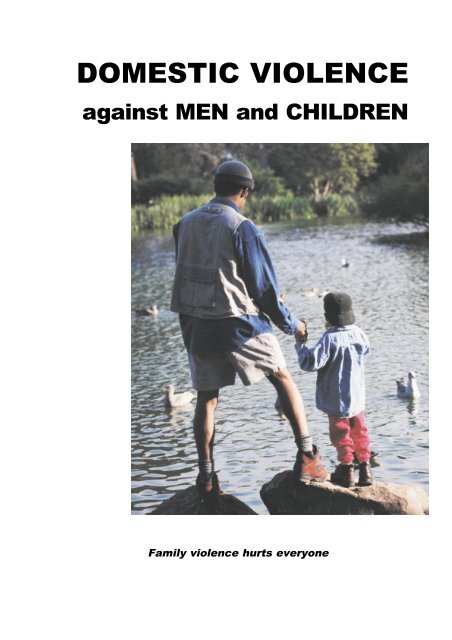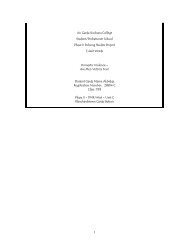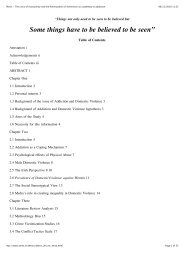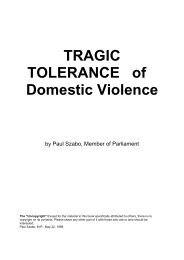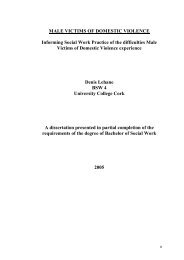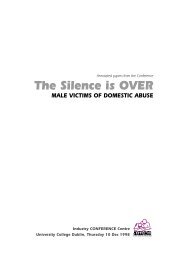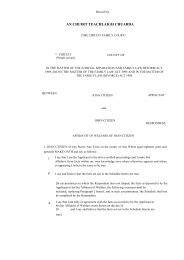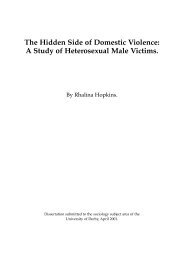Domestic Violence against Men and Children (328K) - Amen
Domestic Violence against Men and Children (328K) - Amen
Domestic Violence against Men and Children (328K) - Amen
You also want an ePaper? Increase the reach of your titles
YUMPU automatically turns print PDFs into web optimized ePapers that Google loves.
“When paradigms change, the world itself changes with them. Led by a new paradigm,scientists … see new <strong>and</strong> different things when looking with familiar instruments in placesthey have looked before. It is rather as if the professional community has been suddenlytransported to another planet where familiar objects are seen in a different light <strong>and</strong> arejoined by unfamiliar ones as well.”Thomas S. KuhnWhile we have taken every precaution to ensure that the information contained in this booklet is accurate,we do not accept responsibility for errors, omissions or inaccuracies contained within.It is intended for information purposes only.
ContentsIntroduction 31.ABOUT AMEN 5a. Background 5b. <strong>Amen</strong>’s philosophy 5c. Support services 5d. Legal services 62.DOMESTIC ABUSE/VIOLENCE 7a. Definition of domestic violence 7b. Physical violence 7c. Psychological violence 7d. Sexual violence 8e. The effects of domestic violence on men 8f. The effects of domestic violence on children 8g. Mutual violence 93.ADVICE FOR MEN 10a. What to do if you are being abused 10b. Legal protection 10c. Barring & safety orders 10d. Protection orders 11e. Interim barring orders 11f. Who can apply 11g. The hearing 12h. Ancillary orders 13i. Criminal law 134.APPENDICES 14a. Excerpts from letters to <strong>Amen</strong> 14b. Useful contacts 16
• Counselling• Court Accompaniment• Emergency Accommodation<strong>Amen</strong> also:• Works in partnership with Meath County Council in providing refuge accommodation formen.• Works in partnership with the Department of Health <strong>and</strong> the North Eastern Health Board• Organises conferences, workshops <strong>and</strong> seminars• Lobbies for social <strong>and</strong> legal reform, <strong>and</strong> services for men• Publishes education <strong>and</strong> information material.• Provides training for volunteers, professionals <strong>and</strong> groups working with men who experienceabuse - social workers, health care professionals, Gardaí <strong>and</strong> others.• Assists students who are conducting research .d. Legal services<strong>Amen</strong> offers support <strong>and</strong> assistance for men on applications for protection, barring, safety, custody,access <strong>and</strong> maintenance orders, divorce <strong>and</strong> separation.<strong>Men</strong> seeking legal redress can find the experience of court traumatic. The culture of courts canbe intimidating <strong>and</strong> confusing. For a man who is being abused the problem is compounded bymany factors - for example, the fear of facing his abuser in a court of law, the threat of retaliation<strong>and</strong> the unfavourable treatment of men in the Family Law courts.A man who is supported through this process is in a much better position to deal with the stress<strong>and</strong> the prejudices of court <strong>and</strong> to follow through with his decision to seek a legal remedy.<strong>Amen</strong> recommends that men seek legal advice from a family law solicitor. In cases where menare not legally represented Judges may allow a friend (known as a 'McKenzie friend') toaccompany them in the courtroom.How <strong>Amen</strong> Can Help?<strong>Amen</strong> volunteers help men through the legal process by:• Preparing the man before he goes to court - explaining court procedures, preparing a history,explaining the law in lay man's terms• Providing emotional support, both before <strong>and</strong> after the court proceedings• Helping the man to deal with the decision of the court, or to appeal it• Helping the man to decide on possible follow-up proceedings/options• Helping the man to decide on safety measures for himself <strong>and</strong> his children6
every member of the family, including men. Otherwise, one sub-group, the children of menwho are abused in the home, will continue to be ignored.Many researchers fail to differentiate between abused children <strong>and</strong> those who witness familyviolence. It has been suggested that both witnessing abuse <strong>and</strong> also being abused is a doubleblow for children <strong>and</strong> appears to be associated with more serious problems for children thanwitnessing violence alone. Each child will react differently to being abused <strong>and</strong>/or witnessingabuse. Their reactions will vary depending on the intensity <strong>and</strong> frequency of the abuse, theirage, sex, temperament <strong>and</strong> the role models available to them. Some of the effects on childrenliving in a violent situation are: poor school performance, low self esteem, disruptive/abusivebehaviour, confusion, anxiety, guilt, anger, sleeping problems <strong>and</strong> insecurity. Childhood exposureto parental abuse closely correlates to perpetration of violence in adult life - i.e., a childwho witnesses abuse is much more likely to go on to abuse a partner, perpetuating a ‘cycle ofviolence’.As long as attempts to address the effects of family violence on children are based on anapproach that largely deems men as the sole perpetrators of domestic violence, they are unlikelyto reach beneath the surface of the problem, or to provide anything other than a partial solution.Treating domestic violence as a family issue rather than a gender issue would enable amore constructive <strong>and</strong> balanced review of the effects of violence on children. Such anapproach would include the experiences of men, women <strong>and</strong> all children as victims of domesticviolence <strong>and</strong> would lead to more effective remedies.g. Mutual violenceThree recent Irish gender neutral surveys show that men <strong>and</strong> women are equally likely to beboth victims <strong>and</strong> perpetrators of domestic violence <strong>and</strong> that mutual violence is more commonthan male-only or female-only violence:1. a study carried out for the Marriage <strong>and</strong> Relationship Counselling Service (MRCS)2. a study conducted for Accord <strong>and</strong>3. A research report for the Department of Health.In the MRCS study showed that domestic violence between couples tends to be mutual in athird of all cases (33%), female-perpetrated in four out of ten couples (41%) <strong>and</strong> male-perpetratedin a quarter of couples (25%).The Accord study found that where there was domestic violence, 46% involved mutual violence;in 30% of cases it was perpetrated by women only <strong>and</strong> in 24% by men only.The Department of Health study found that, where domestic violence occurs, 50% was mutualwith the remainder divided equally between women-only <strong>and</strong> men-only perpetration.These findings reflect the results of all independent two-sex studies carried out world-widewhich Over 100 such studies are listed on the <strong>Amen</strong> website www.amen.ie.9
3. ADVICE FOR MENa. What to do if you are being abused• talk to someone you can trust - such as a close friend or family member• seek legal advice on the remedies available to you• keep a record of the abuse- dates, times, injuries• report the abuse to the authorities - GP, the Gardaí, social workers• ensure that all the details of your injuries <strong>and</strong> the assault are recorded• do not leave the family home unless you <strong>and</strong> your children are in danger• do not be provoked into retaliating.You may wonder what you are doing to cause your partner to behave like this or what you c<strong>and</strong>o to make her stop. You may feel that she controls your life <strong>and</strong> keeps you isolated. You donot know when the next abuse will occur, but you live in constant fear of it. You may neverhave told anyone because you feel embarrassed <strong>and</strong> ashamed <strong>and</strong> guilty about the abuse. It isimportant that you know your rights.• You have the right to expect the same help that is available to female victims of domesticabuse• You are not the cause of your partner’s violent behaviour• You do not deserve to be abused your partner or anyone else including statutory or socialservices• You have the right not be discriminated <strong>against</strong> because you are a manb. Legal protectionThe information here is very general in nature but we have tried to make it as appropriate aspossible for abused men <strong>and</strong> their children. If you are thinking of applying to the court for protectionit would be advisable to seek advice from a solicitor who specialises in family law <strong>and</strong>can arrange for you to be represented at a court hearing. If you cannot afford to pay for a solicitorhelp may be provided by the Legal Aid Board. They will provide a solicitor <strong>and</strong>, if necessary,a barrister provided you meet their eligibility requirements.c. Barring <strong>and</strong> safety ordersThe 1996 Act prescribes two principal forms of protection - the barring order <strong>and</strong> the safetyorder.A safety order “prohibits a person from further violence or threats of violence. It does notoblige that person to leave the home. If parties live apart, the order prohibits the violent personfrom watching or being in the vicinity of the home.A barring order directs the person <strong>against</strong> whom it is made (the respondent), “if residing at aplace where the applicant” or a dependent child resides “to leave such a place”. This prohibitsthe respondent from further violence or threats of violence. It is not necessary for the applicantto be living in the family home when they apply for a barring order - e.g., a person can apply10
from an address other than the family home.The District Court has the power to grant a safety order for a period of to five years <strong>and</strong> a barringorder up to three years. The Circuit Court can grant orders for longer periods of time.d. Protection ordersIt is possible to apply for a protection order, pending the hearing of an application for either abarring order or a safety order. A protection order has the same effect as a safety order. The Actspecifically empowers the court to make a protection order ex parte (in the absence of therespondent) without the service of any documentation on the respondent. This means that theorder can be made without the other party being present or informed of the hearing.To apply for a protection order, you should tell the staff in the District Court that you need thisorder as a matter of urgency. You must appear before a Judge <strong>and</strong> state the reasons why youneed protection. The judge will decide whether your application should be granted. A writtenrecord of the information you give in order to obtain the protection order is kept on the courtfiles <strong>and</strong> a copy may be obtained by the respondent.e. Interim barring ordersA court can grant an interim barring order, pending the hearing of an application for a barringorder. An interim barring order has immediate effect requiring the respondent to leave the familyhome. An interim barring order can be applied for on an ex parte basis without the service ofany documentation on the respondent. Such an order is effective for a period, not exceeding 8working days, unless, on application by the applicant for the barring order <strong>and</strong> on notice to therespondent, the interim barring order is confirmed within that period by order of the court.f. Who can apply?• Spouses - may seek protection <strong>against</strong> each other.• Cohabiting couples - people who are not married but are living together. For a safety order,the couple must have been living together for 6 months during the 12 month period beforethe application for protection was made. For a barring order, the couple must have been livingtogether for 6 months during the 9 months before making an application. A barring orderwill not be made <strong>against</strong> a cohabitee who owns the place of ownership or who has greaterownership rights than the applicant.• Parents - may seek protection <strong>against</strong> their children over the age of 18 years. However, acourt will not grant an order <strong>against</strong> a child who owns the place of residence or who hasgreater ownership rights than the parent making the application. Parents may also apply forprotection on behalf of their child.• Persons living together in the same residence - may apply for protection <strong>against</strong> each otherprovided the person <strong>against</strong> whom the order is sought is someone over 18 who is being violent<strong>and</strong> the court decides that the relationship is not primarily based on a contract eg. a sisteror brother.• <strong>Children</strong> - can apply for a barring or safety order, but the application must be made by anadult or a Health Board.11
• Health Boards - may apply for protection on behalf of a person <strong>and</strong>/or that person’s dependentchildren in circumstances where the person cannot apply themselves.g. The hearingCourt hearings in family law case are held in camera. This means that only the applicant, therespondent, the court officials <strong>and</strong> legal representatives are present. Witnesses may be calledbut can only remain in the courtroom while they are giving their evidence. <strong>Children</strong> may alsobe called at the judge's discretion <strong>and</strong> may be heard in the judge's chambers without any of theother parties being present. <strong>Men</strong> can employ a solicitor or they may represent themselves. Theyshould assemble all necessary evidence for the court in advance.Information which is needed when seeking a Court Order includes:• Names <strong>and</strong> addresses of both the applicant <strong>and</strong> the respondent• The type of order(s) the applicant wishes to apply for• The names <strong>and</strong> DOBs of all children of the marriage/relationship <strong>and</strong> whether any of thechildren suffer from any effects from the violence (mental/physical disability, adverse reactions,upset at school)• The facts the applicant relies on - details of incidents of violence <strong>and</strong>/or threats of violence<strong>and</strong> other forms of intimidation• Any evidence likely to support the facts - photographs of injuries due to physical abuse, aletter from a doctor as to complaints of injuries (only if doctor attends <strong>and</strong> gives evidence orif contents are not disputed by the respondent) or evidence from the Gardaí• Names <strong>and</strong> addresses of all or any witnesses• Details of any previous Barring or Safety Orders• Details of all contact with Gardaí in respect of any abuse suffered.Suggestions when giving evidence:• Stick to the facts• Tell the truth• Try to stay calm• Speak loud <strong>and</strong> clearly• Direct your answers to the judge - he/she ultimately makes the decision about the case• Bring documents <strong>and</strong> evidence that you may need to prove your case.How is the Respondent Informed of the Making of an Order?A judge pronounces his decision in the court <strong>and</strong> this is followed up with a written documentcalled an “order” which is usually sent by ordinary post to the respondent. The court officesends a copy of the order to the local Garda station. It is useful to notify the Gardaí yourselfimmediately about the order as it may be necessary to call the Gardaí to your home shouldthere be a breach of the order by the respondent. You should keep a copy of the order with youat all times.12
h. Ancillary ordersThe court has the power under Section 9 of the <strong>Domestic</strong> <strong>Violence</strong> Act, 1996 to make supplementaryorders where asked to do so without the party being required to make a separate application.For example, either partner may want the court to deal with issues of custody, access ormaintenance. It is therefore advisable to discuss these issues with your solicitor before you goto court.(a) CustodyThis is the physical day-to-day care <strong>and</strong> control of children. It is possible for a parent to applyfor sole custody or joint custody. If you are unhappy with a court decision you may appeal<strong>against</strong> it. Appeals must be lodged within10-14 days. In certain cases, the courts can order areport under Section 20 of the Child Care Act 1991 or Section 47 of the Family Law Act 1995.(b) AccessThis is the contact between children <strong>and</strong> the parent with whom they do not ordinarily live.When considering access, the courts may take account of the wishes of the children, dependingon their age.(c) MaintenanceThis is any regular financial support paid by one parent for the support of a dependent spouse<strong>and</strong> /or dependent children. If the sum to be paid is not agreed, then an application can bemade to a Court for a maintenance order. Spouses living together or apart can apply. An applicationcan be made by a parent of the dependent child / children, both marital <strong>and</strong> non-marital.(d) GuardianshipThis is the legal status of the relationship between parents <strong>and</strong> their children. It involves theduty to maintain <strong>and</strong> properly care for children, the right to make decisions about the children’seducation, <strong>and</strong> to make decisions about their religious upbringing, health <strong>and</strong> general welfare.Married fathers are automatically guardians of their children. Unmarried fathers can beappointed guardians either by a court order or by agreement with the mother of the child(ren)in which case they must both sign a statutory declaration to that effect. (While an applicationfor guardianship cannot be made as an ancillary application under section 9, it is important forall unmarried fathers to establish their legal status as guardians at the earliest opportunity).i. Criminal lawNon-Fatal Offences Against the Person Act, 1997The remedies under this Act are available to all citizens including those who are not entitled toavail of protection under the <strong>Domestic</strong> <strong>Violence</strong> Act, 1996. A complaint should be made to theGarda who may bring a prosecution <strong>against</strong> the person who is perpetrating the abuse, harassingor intimidating you <strong>and</strong>/or your children.13
4. APPENDICESa. Excerpts from letters to <strong>Amen</strong>If I was ten minutes late coming from work, she would tear into me, often slapping me acrossthe face; I could do nothing right for her. I washed the clothes, did the ironing <strong>and</strong> vacuumedthe house before I went to work. I got up to the boys at night when they were babies while shestayed in bed. I had to leave because of the threats from her family <strong>and</strong> the beatings from mywife. I just did not know her next move. I can’t take much more, watching the pain she’s puttingthe boys <strong>and</strong> myself through.The boys need both their parents. As it is, I am afraid that I may lose my children. MartinMy wife has been beating me for years now but for the sake of the child <strong>and</strong> my home, I havesaid nothing, also because of the embarrassment of people laughing at me. I am big <strong>and</strong> she issmall. Nobody would believe that when she was pregnant, she stabbed me with a knife; but forthe sake of the child I let it go. I don’t want to lose my child but she tells me that the judge willnot believe me <strong>and</strong> he always takes the woman’s side. After speaking to a Garda <strong>and</strong> <strong>Amen</strong>, Ithink I might have a chance to get my life back. My wife is having an affair <strong>and</strong> she stays outall night. I always took my child to Mass. Now she won’t let him go with me. TomWhen the baby was about eight to ten months old, I was feeding him when she came in <strong>and</strong>said that she did not know why I was so fond of him as he was not even mine. I felt sick but Itold her I did not care, that I loved him <strong>and</strong> I would mind him. Now she only has time for herboyfriend; she is gone three <strong>and</strong> four nights a week with him. In the morning my young sonsays to me, “Is mammy home yet?” It is so sad to hear him say that. We would be better off onour own. She hit me across the back with the brush <strong>and</strong> said that I would soon be gone. This isa sad life. When her boyfriend sleeps with her I have to lock the door from the inside. I haveno say in my house. If the judge hears this he will kick me out <strong>and</strong> take my child from me.JimDear <strong>Amen</strong>,As far back as I can remember my Mother was the one who was physically <strong>and</strong> emotionallyabusive. I watched as she hit my father with whatever was at h<strong>and</strong> over <strong>and</strong> over again. I listenedas she cursed him to death <strong>and</strong> worse. My brothers <strong>and</strong> I were taught that he was a disgraceto humanity we were told that to bear his name was a shame. He was a weakling, a liar, asneak <strong>and</strong> any other kind of filthy name she could conjure up. If she was doing something toour Father, or angry with him, we were to side with her <strong>and</strong> deny what we saw before our owneyes. We were to defend her <strong>and</strong> to abuse him alongside her. We were subject to the sameabuses.I remember anger <strong>and</strong> arguments for the early part of my childhood. I can’t tell how manytimes my father would rush into my room in the night with my Mother hot on his trail withwhatever weapon was at h<strong>and</strong> to hit him. I remember a soup ladle l<strong>and</strong>ed across his head, alarge seashell, <strong>and</strong> a hurley on another occasion. I never saw my father hurt anyone. NancyThe first time she used physical violence she bit into my arm. This was significant because it14
was the first time she committed physical violence. She now knew that I would not hit herback. From that point on she ruled by violence or the threat of violence. She dominated thehousehold <strong>and</strong> she did whatever the hell she liked. In the three years before the end of the marriage,the level of violence increased. At first it was sporadic, then weekly, then several times amonth, <strong>and</strong> at the end it was virtually every single day.SeanMy wife was frequently violent; there would not be any specific reason for a particular act ofviolence. It could be that she wanted to spend money we did not have, or I did not respond toher requests as quickly as she liked. She might be angry with a member of her family, or simplyin one of those moods. When violence did not get her what she wanted, she would takeexcessive medication <strong>and</strong> claim she was going to kill herself. I now know she had no intentionof doing herself any real harm.MarkThere is hardly a day that goes by without a thump from my wife. We have two children aged8 <strong>and</strong> 10 years. Up to a few years ago, the children did not see or hear any of my beatings, butnow my wife does not seem to mind this anymore, only to warn them that they are never tosay to anyone outside what goes on in our home. No matter what I do or say, it is taken out ofcontext, blown up <strong>and</strong> used as the start of rows. Then the beating starts <strong>and</strong> I have had blackeyes, two broken teeth, bruises all over my body. The excuse I give is I had an accident orwalked into a door. My own family do not know about my unhappiness in this marriage. Ihave a good job but my wife controls our finances. I clean, wash <strong>and</strong> cook when I come homefrom my work <strong>and</strong> at weekends, I polish <strong>and</strong> clean. I walk to the park with the children, but amgiven a certain time to return. I panic if I am late getting back, as I know I will once again get athump. Now to everyone else, she is a lovely person, laughing <strong>and</strong> joking with visitors <strong>and</strong> herfriends, but I try not to join in just in case I say the wrong things. I stay in the kitchen makingthe coffee or tea when her friends call. . How do I get help?CormacHello Mary,I wrote to you about nine months ago about the abuse of my partner.I told you that most of the time we are happy together <strong>and</strong> madly in love. But every now <strong>and</strong>then my temper sours <strong>and</strong> I lose it to the stage of hitting him. Niall, my partner, is generally aquiet man <strong>and</strong> doesn’t like any confrontation of any sort. I am extremely temperamental <strong>and</strong>dramatic of any situation. I want to stop <strong>and</strong> I just don’t know what to do. The abuse is becomingmore frequent. I went to a counsellor <strong>and</strong> an alternative medical doctor <strong>and</strong> a medical doctoralso. I have been on Prozac (which didn’t help) <strong>and</strong> alternative medicine also. Nothingseems to be helping me.Please can you give me some address to contact or books I can read that may help me. I needto sort this out before Niall leaves me.Deirdre15
. Useful contactsACCORDEmail accordco@iol.ieNavan 046 9023146Cavan 049 4331378Monaghan 047 83359Drogheda 041 9829614/ 98413860ACCORD offers support to relationships in difficulty.AIM Family Services6 D’Olier Street, Dublin 2. Tel. 01 6708363,Email aimfamilyservices@eircom.netAIM provides mediation, counselling <strong>and</strong> information on family law.Addiction Resource Centre52 Glaslough Street, Monaghan. Tel. 047 72100Provides help for those addicted to alcohol, drugs or those living with the problem.Barnardos159 Moneymore, Drogheda, Co. Louth. Tel. 041 9841965Email info@barnardos.ie,Barnardos provides a range of family support services.Beginning Experience for AdultsDowdstown House, Dalgan Park, Navan, Co. Meath. Tel. 046 9021407.A support programme for recently separated adults.Citizens Information CentresNavan 046 9074086 Cavan 049 4332641Drogheda 041 9844508 Dundalk 042 9329149Monaghan 047 82622Provide free <strong>and</strong> confidential information on citizens rights <strong>and</strong> entitlements.Community WelfareNavan 046 9021595 Cavan 049 4362403Drogheda 041 9838605 Dundalk 042 9336148Monaghan 047 71922Counselling CentreDowdstown House, Dalgan Park, Navan. Tel. 046 9021407Offers professional counselling for family problems, depression, addiction etc.16
Court ClerksCo. Cavan District 049 4331585 Co. Cavan Circuit 049 4331530Co. Monaghan District 047 81417 Co. Monaghan Circuit 047 82388Dundalk District 042 9334343 Dundalk Circuit 042 9334066Drogheda District 041 9838313Trim District 046 9031360Family Mediation ServiceTel. 01 8728277.Dundalk Tel. 042 9359410Helps couples to negotiate separation <strong>and</strong> divorce agreements.Garda SíochánaNavan 046 9021445 Co. Cavan 049 4331300Drogheda 041 9874200 Dundalk 042 9333577Co. Monaghan 049 82222GingerbreadCarmichael House, Dublin 7.Tel. 01 6710291A support group for those parenting alone.Irish Society for the Prevention of Cruelty to <strong>Children</strong> (ISPCC)Tel. 01 6794944/6795129.Drogheda 041 9833406 Monaghan 047 84420Works to prevent physical, emotional <strong>and</strong> environmental cruelty to children.Legal Aid BoardTel. (01) 6615811 / 2400900Email legalaid@eircom.netLaw Centres:Navan 046 9072515 Co. Cavan 049 4331110Drogheda 041 9836084 Dundalk 042 9330448Co. Monaghan 047 84888A statutory body that provides legal aid <strong>and</strong> advice in civil cases.Táin CentreCounty Infirmary, Navan, Co. Meath. Tel. 046 9027805.Provides help for those who are mentally ill <strong>and</strong> promotes positive mental health.<strong>Men</strong>'s Council of Irel<strong>and</strong>7 Parkview, Navan, Co. Meath Tel. 087 288827734 Pineview Grove, Aylesbury, Tallaght, Dublin 24MCI is the national representative body for men <strong>and</strong> men's organisations in Irel<strong>and</strong>.17
<strong>Men</strong>’s Networking Resource CentreBallymun, Dublin 11. Tel. 01 8623160Provides a confidential helpline, support services <strong>and</strong> information for men.<strong>Men</strong> on the MoveBalsaw, Wilkinstown, Navan, Co. Meath. Tel. 046 9054874Helps men who have gone through separation <strong>and</strong> other traumas to rebuild their lives.North Eastern Health BoardNavan Road, Kells, Co. Meath. Tel. 046 9040341Hospitals:Navan 046 9021210 Cavan 049 436 1399Drogheda 041 9837601 Dundalk 042 9334701Monaghan 047 81811Public Health Nurse / Social WorkerNavan 046 9021595 Cavan 049 4361822Dundalk 042 933 2287 / 932 7503 Drogheda 041 987 4685 / 983 8605Co. Monaghan 047 30400Health Promotion Dept.Tel. 046 9071872Parental EqualitySocial Services Centre, Dundalk. Tel. 042 9333163Provides support for those seeking or practising joint custody <strong>and</strong> shared parenting.ParentlineCarmichael HouseEmail parentline@tinet.ieTel. (01) 8733500Provides a helpline <strong>and</strong> support services for parents.Rape Crisis CentresFreephone 1800 212122Dublin 1800 778888Dundalk 042 9339491Provides a helpline, counselling for victims of rape <strong>and</strong> sexual abuse.RIAN Counselling ServiceEmail rian@nehb.ieFreephone 1800 234117Navan 046 9067010Cavan/Monaghan 049 4377111For adults who suffered physical, emotional, sexual or neglectful abuse as children.18
The CARI (<strong>Children</strong> At Risk in Irel<strong>and</strong>) FoundationTel. 01 8308529Services for children <strong>and</strong> families affected by sexual abuse.The SamaritansNational Helpline 1850 60 90 90Drogheda 041 9843888A support service to people who are anxious, depressed or suicidal.Simon CommunityBarrack Street, Dundalk. Tel. 042 9339583A voluntary organisation that provides shelters for homeless people.TREOIREmail treoir@indigo.ieTel. 01 6700120The national federation of agencies who provide services to unmarried parents.Victim SupportFreephone 1800 661711 15Clanbrassil Street, Dundalk 042 9326752Offers emotional support <strong>and</strong> practical help to victims of crime.FLAC (Free Legal Advice Centres Limited)Tel. 01 679 4239Legal advice <strong>and</strong> information on a wide variety of matters, including family law.Marriage <strong>and</strong> Relationship Counselling Services (MRCS)Tel. 01 679 9341Counselling on marriage, relationship, separation, divorce <strong>and</strong> mediation.Unmarried Fathers <strong>and</strong> Separated Fathers Irel<strong>and</strong>Tel. 086 8879444Provides support for Unmarried <strong>and</strong> Separated Fathers <strong>and</strong> their <strong>Children</strong>Women's AidFreephone 1800 341900Provides information <strong>and</strong> support to women who are being abused in the home.Women's RefugesNavan 046 9022393Dundalk 042 9333244 Drogheda 041 9844550Monaghan 047 72311Provide information, support <strong>and</strong> emergency accommodation for abused women.19
This publication has been produced with the financial support ofThe North Eastern Health Board“Society Does Not Have The RightTo Discriminate Against Victims Of <strong>Domestic</strong> <strong>Violence</strong>Because Of Their Gender”Published & Distributed by AMEN 2003.9-10 Academy St., Navan, Co. MeathTel & Fax: (+353) 046-23718E-mail: amen@iol.ieWeb Site: www.amen.ieCharitable Status No: CHY13025


